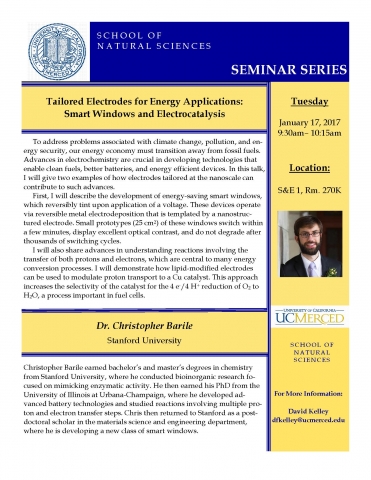
Dr. Christopher Barile
Stanford University
Abstract:
To address problems associated with climate change, pollution, and energy security, our energy economy must transition away from fossil fuels. Advances in electrochemistry are crucial in developing technologies that enable clean fuels, better batteries, and energy efficient devices. In this talk, I will give two examples of how electrodes tailored at the nanoscale can contribute to such advances.
First, I will describe the development of energy-saving smart windows, which reversibly tint upon application of a voltage. These devices operate via reversible metal electrodeposition that is templated by a nanostructured electrode. Small prototypes (25 cm2) of these windows switch within a few minutes, display excellent optical contrast, and do not degrade after thousands of switching cycles.
I will also share advances in understanding reactions involving the transfer of both protons and electrons, which are central to many energy conversion processes. I will demonstrate how lipid-modified electrodes can be used to modulate proton transport to a Cu catalyst. This approach increases the selectivity of the catalyst for the 4 e-/4 H+ reduction of O2 to H2O, a process important in fuel cells.
Bio:
Christopher Barile earned bachelor’s and master’s degrees in chemistry from Stanford University, where he conducted bioinorganic research focused on mimicking enzymatic activity. He then earned his PhD from the University of Illinois at Urbana-Champaign, where he developed advanced battery technologies and studied reactions involving multiple proton and electron transfer steps. Chris then returned to Stanford as a postdoctoral scholar in the materials science and engineering department, where he is developing a new class of smart windows.



